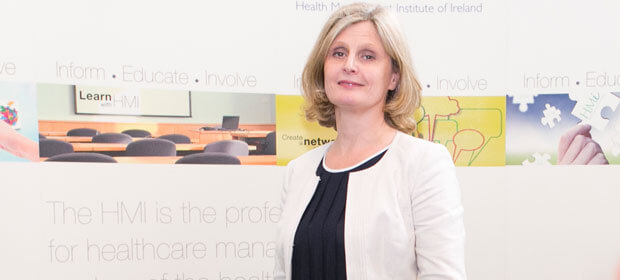Moninne Howlett, Chief II Pharmacist (Informatics) describes a project to reduce medication error to critically ill children, for which she and Cormac Breatnach, Consultant Paediatric Intensivist, both of Our Lady’s Children’s Hospital, Crumlin received a special commendation from the judges at this year’s HMI Leaders Award.

The project – one of the six finalists in the award – is titled “Creation and Implementation of a National Drug Library of Paediatric Standardised Concentration Infusions as a Medication Error Reduction Strategy for Critically Ill Children in Ireland.”
By early January 2015, this system for the delivery of infusions was implemented successfully across both PICUs and the paediatric transport service.
Critically ill paediatric patients are a vulnerable cohort of patients at high risk of medication error. The particular risks associated with paediatric and neonatal infusions have been addressed by safety agencies and governmental bodies over the last 15 years. Recommendations include the replacement of traditional individualised weight-based infusions with standard concentration infusions, and the use of smart-pump technology. Smart-pumps are computerised infusion devices with multiple safety features that include customised drug libraries, dose calculations based on programmed patient weights and the setting of dose limits. They have been shown to be highly effective in reducing serious and occasionally fatal medication errors. Implementation rates in Europe fall far below those in the US, and guidelines or standards on development of specific drug libraries do not exist. Up until 2012, implementation of these recommendations had not yet occurred in any paediatric and neonatal intensive care unit in Ireland.
To address this, a multi-phase project was undertaken over the last four years by the Pharmacy and Paediatric Intensive Care Departments of Our Lady’s Children’s Hospital, Crumlin (OLCHC). In 2012, they developed and implemented a smart-pump drug library of paediatric standardised concentrations into their paediatric intensive care unit (PICU), operating theatres and cardiac ward. This involved a marked change in practice across numerous settings within the hospital and required considerable ‘buy-in’ and consensus from a heterogeneous group of clinicians and nursing staff. What resulted was a highly successful initiative, received overwhelmingly positively by staff and crucially produced significant reductions in medication errors.
In light of this and with the new Irish Paediatric Acute Transport Service being commissioned in 2014, which was to be run out of both OLCHC and Temple Street, a decision was made to extend the project beyond OLCHC.
With the current resource restraints in the Irish health service, the sharing of expertise and experience, reduced drug library build costs and effective collaboration across sites maximised limited resources.
A cross-site collaborative multi-disciplinary working group was formed and the OLCHC drug library was further developed to enable its use across all sites. This again involved substantial negotiations to achieve consensus and ensure standardisation of practices. In the absence of an existing over-arching governance structure and to ensure the integrity of the library was maintained, legally binding agreements were drawn up between OLCHC and recipient sites, to prevent future deviations from the agreed library.
By early January 2015, this system for the delivery of infusions was implemented successfully across both PICUs and the paediatric transport service. As a result, significant progress was made in advancing standardised care for critically ill children in Ireland, aligning all tertiary sites with best practice recommendations and aiding preparation for unification as part of the planned New Children’s Hospital. Furthermore, safety was maximised for patients during the high-risk process of transport and retrieval from regional hospitals to PICU, and between PICUs. Also, with the current resource restraints in the Irish health service, the sharing of expertise and experience, reduced drug library build costs and effective collaboration across sites maximised limited resources.
In tandem with the extension out to Temple Street and paediatric transport, a further initiative was undertaken by OLCHC to extend this project to the broader neonatal population. Hence in 2014, a subsidiary neonatal-specific smart-pump drug library was developed. This initiative was endorsed by the Neonatal Advisory Group of the National Clinical Programme for Paediatrics and Neonatology, including the National Neonatal Transport Programme, and the National Maternity and Neonatal Clinical Management System project team. The neonatal intensive care unit in the Coombe Women & Infants University Hospital was the pilot site and implementation occurred there in July 2016. Implementation in Cork University Maternity Hospital is imminent, with a phased roll out to the other 17 neonatal units planned. A further phase is to extend this system to paediatric patients cared for in adult ICUs, regional hospitals or during stabilisation prior to transport to a paediatric tertiary hospital. Negotiations are underway with the HSE to develop a national managed service, support and governance for this project.
A long-term objective is that current practices in Ireland for preparing high-risk infusions, overwhelmingly performed by nurses at the bedside, will be replaced by the use of pre-prepared infusions. The standardisation achieved by this project has made significant progress towards achieving this goal.
Our hopes for this project are that it will continue to be supported to ensure we optimise the safety of these most vulnerable patients.

